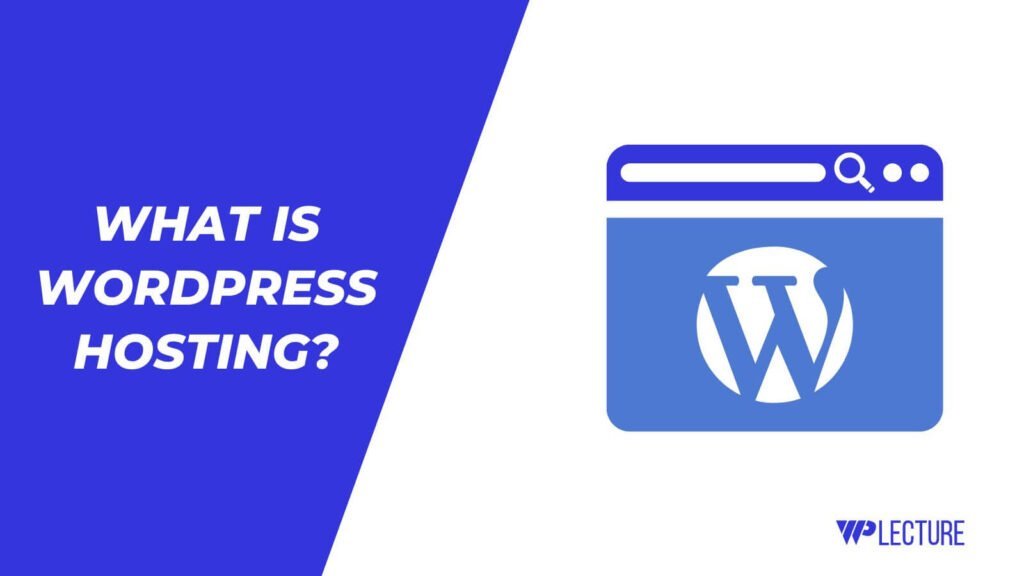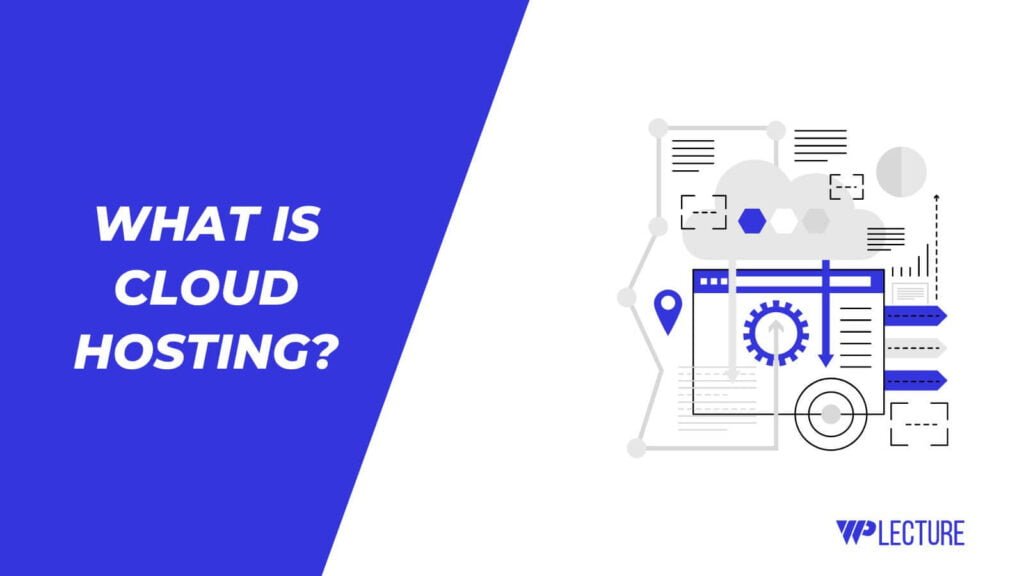E-commerce is the most trending business in this digital era. With the rising demand for online shopping, it has become essential for companies to have a strong online presence.
Because of the popularity of Ecommerce, there are a lots of ways to start your own Ecommerce business; one popular way is by using a Content Management System (CMS).
CMS is the easiest way to start your eCommerce store without writing a single line of code or hiring a high-paying developer. Currently, hundreds of CMS ecommerce builders are available on the internet, and finding the best one for your business can be a time-consuming task.
To find the most suitable ecommerce CMS for you, we have compiled a list of the 7 best CMS for eCommerce in 2025.
Quick Access
ToggleWhat are the 7 best CMS for eCommerce in 2025
Before diving into our list, let’s take a quick overview of the 7 best CMS for eCommerce in 2025:
- WordPress
- Shopify
- Wix
- Squarespace
- BigCommerce
- Magento
- Drupal
1. WordPress
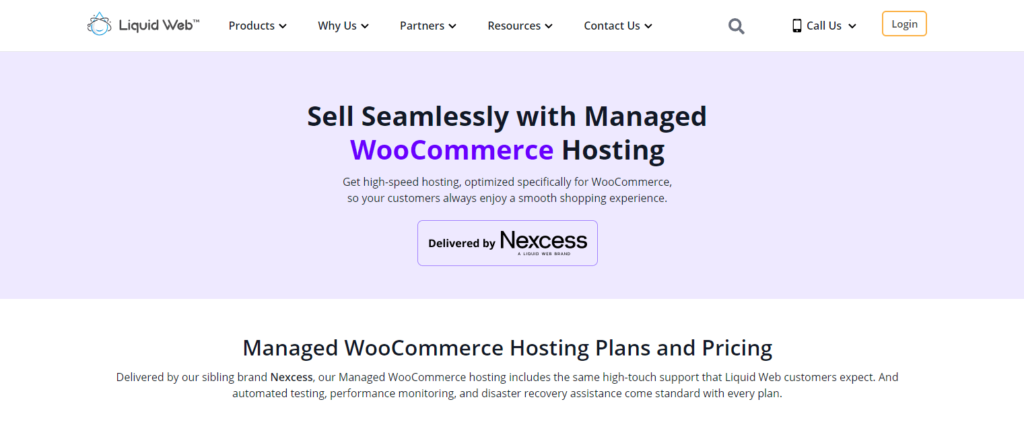
WordPress is the most popular website builder worldwide, and according to research, 42.7% of live websites are made with WordPress.
The reason behind WordPress’s huge popularity is its user-friendly interface and thousands of customization options. WordPress is free to use, but you only need to pay for the web hosting services and domain, which cost around $2/ month and go up to $500/month, depending on your website’s traffic and requirements.
After purchasing the domain and hosting, you need to install WordPress on your hosting server. Now, most web hosting companies offer one-click WordPress installation for free.
After completing the installation process, you need to install the WooCommerce plugin on your WordPress website. WooCommerce is the most popular WordPress plugin for creating online stores. The best part is that it’s completely free to use without any hidden charges.
Using WooCommerce to run an ecommerce website is easy for beginners or non-techy people. You can easily add products, manage orders, and track sales without any technical knowledge. Also, you can integrate different payment methods like Stripe, PayPal, Apply Pay, Google Play, Ali Pay, and more.
To start with WordPress, you first need to purchase the best web hosting to start your ecommerce store. The most popular and reliable hosting companies for WordPress are Liquid Web, Hostinger, Cloudways, and more. But we highly recommend you use Liquid Web because of its high-speed cloud hosting and easy WordPress integration.
Popular Users: TechCrunch, eBay, Sony, CNN, NYT, Samsung, IBM, and TechCrunch.
Pros and Cons
Pros
- User-friendly Interface with limitless customization.
- Best SEO features.
- Huge community support.
- Free to use (excluding hosting and domain charges).
Cons
- Requires frequent updates and maintenance.
- Not suitable for large-scale ecommerce websites.
Pricing
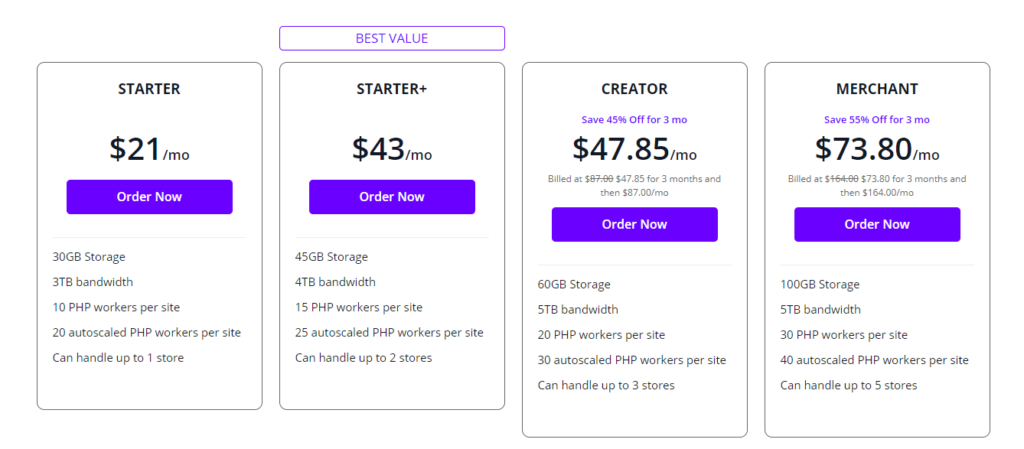
WordPress is free to use, but you need to pay for the web hosting and domain this will cost you around $2 to $500 per month based on the traffic and website requirements.
Currently, most of the web hosting providers offer free domain names with your web hosting package. So, you need to pay any extra money for your domain name.
When discussing web hosting providers, two companies that professionals and experts in the industry recommend are Liquid Web and Hostinger. And these two companies are built for two types of eCommerce site owners.
Hostinger is the most affordable web hosting provider with good website performance and lots of free features. Hostinger WooCommerce web hosting pricing plan starts at $3.99/month and goes up to $29.99/month for the most expensive plan.
On the other hand, Liquid Web is the best option for those who want the best performance, uptime, and customer support. Liquid Web’s WooCommerce hosting pricing starts at $17.50/month and goes up to $912.50/month for the most expensive plan.
2. Shopify

Shopify is the largest and most popular cms for ecommerce, with over 26.2% market share in the ecommerce industry. Over 4.8M online stores are created with this best eCommerce CMS, and over $444+ billion transactions are made through this platform.
The reason behind the popularity of Shopify is its user-friendly interface and drag-and-drop customization option. As a beginner, it’s very helpful to make their eCommerce website with the drag-and-drop builder.
Shopify comes with a thousand premade templates, which is helpful to make an eCommerce website within a few hours. And the best part is most of them are completely free to use for Shopify users.
Shopify also has a large community with thousands of experts, professionals, and developers who are ready to help you with any issue or problem. Free trial for new users.
Popular Users: Gymshark, Kylie Cosmetics, Tesla, Meta, eBay and more.
Pros and Cons
Pros
- User-friendly interface with drag-and-drop customization options.
- Fully focus on eCommerce website
- High performance and uptime
- Largest community support.
Cons
- Expensive pricing plans.
- Transaction fees for external payment methods.
Pricing
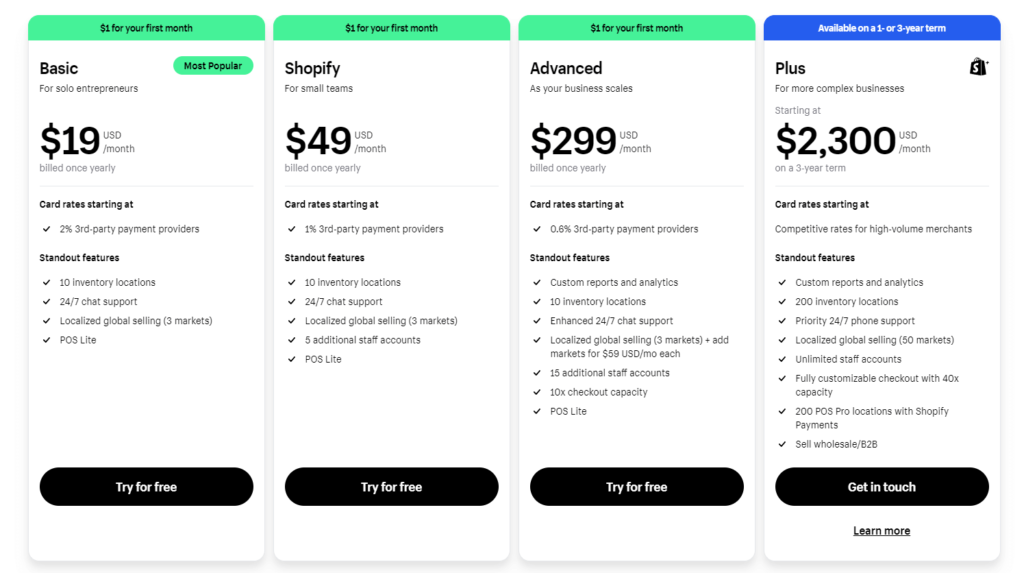
Shopify comes with 3 days free trial and after completing the free trial time, you can also use Shopify for $1/month for up to 3 months if you go with our special link.
They come with 4 different pricing plans, the affordable Basic plan comes at $19/month, the Shopify plan comes at $49/month, the Advances plan comes at $299/month and the most advanced expensive Plus plan comes at $2300/month.
But all of the plans from Shopify except the plus plan, come with the first month for only $1. After that, you need to pay the full price for the second month.
Shopify also charges additional transaction fees for external payment methods like PayPal, Stripe, Apply Pay, Google Wallets, and more. The payment transaction fees for every Shopify payment, in the US, you need to provide 1.5%, and for others, the country you need to give Shopify 2% from every transaction.
3. Wix
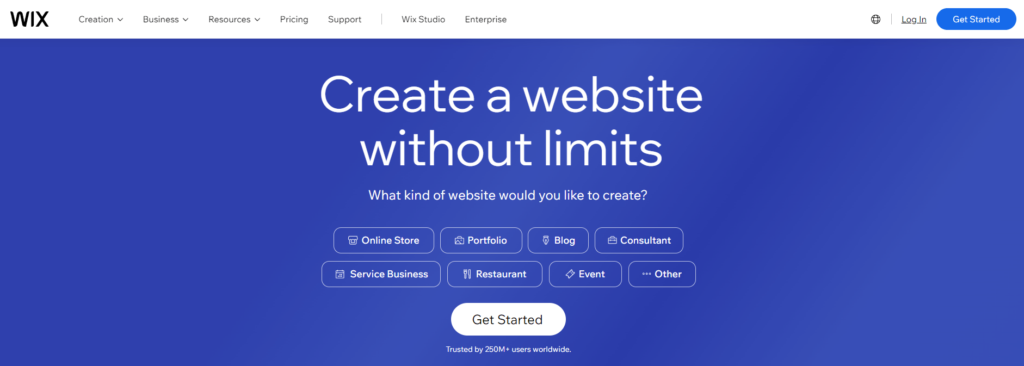
Wix is the 3rd most popular and best cms for online store which currently holds over 16.2% of live eCommerce websites on their platform.
By using wix.com, you can create all kinds of websites, such as online stores, blogs, portfolios, consults, service businesses, restaurants, events, and more. However, their main focus is to make a suitable CMS for online eCommerce stores.
Like other popular CMS builders, Wix also comes with more than 900+ premade templates and demos. This helps create an eCommerce website by importing a premade demo which style you need and then customizing according to your preference.
As a beginner, it should be easy for you to make an eCommerce website by using Wix drag-and-drop customizability options with the visual editor. And their impressive customer support team is ready when you need them.
Popular Users: AirAsia, Fiverr, Tesla, Coca-Cola, Walmart, Nikon, and more.
Pros and Cons
Pros
- Easy drag-and-drop customization options with the visual editor.
- 900+ large variety of templates to choose from.
- Good customer support.
- All the payment method support
Cons
- Limited SEO features compared to other CMS platforms.
- Higher pricing plans for ecommerce websites.
Pricing
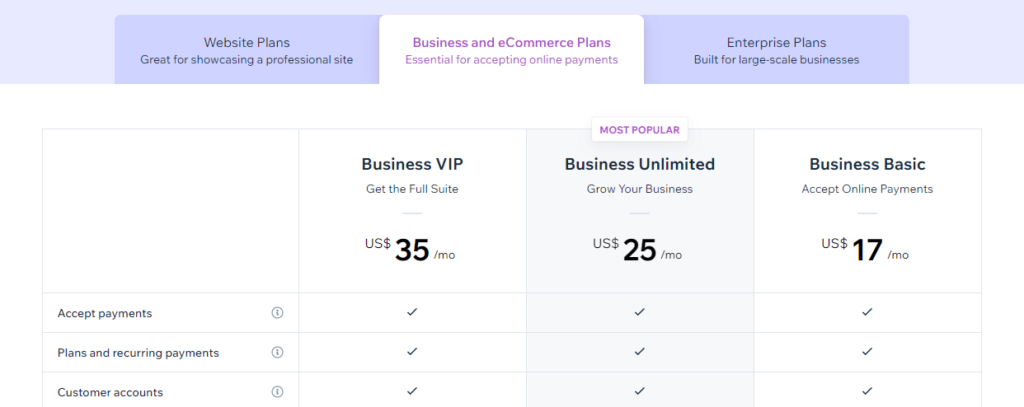
Wix comes with three different pricing plans for those who want to create their website by using the Wix CMS such as Websites plan, Business and Ecommerce plan, and Enterprise package.
But only the Business and Ecommerce package is suitable for creating an eCommerce store. Business and Ecommerce packages come with 3 different pricing plans for three different types of users.
Wix Business Basic plan comes at $17/Month, the Business Unlimited plan comes at $25/month and the Business VIP plan comes at $35/month. All of the plans offer almost pretty similar features as each other.
All of the plan offers Accept payments, Customer accounts, Free domain for 1 year, Remove Wix branding, Unlimited Bandwidth, Up to 50,000 products, Abandoned cart recovery, Subscriptions, Sell on social channels, Dropshipping by Modalyst, and more.
4. Squarespace
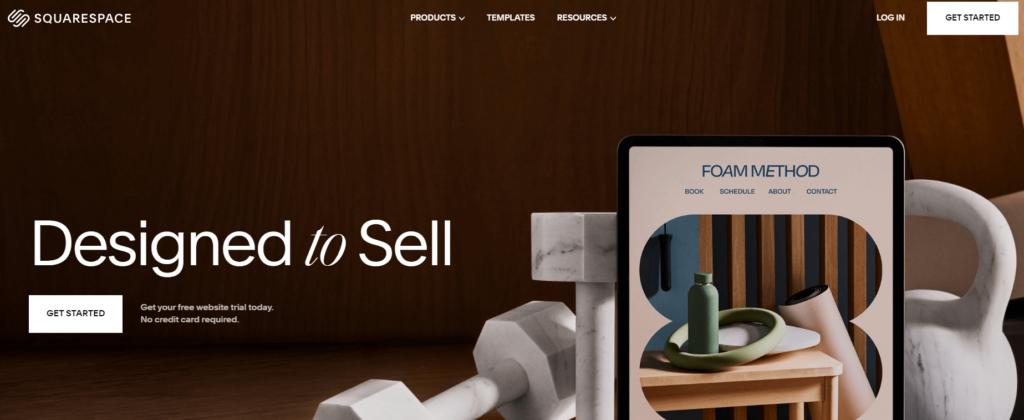
Squarespace is the 4 most popular and used best CMS for Ecommerce websites, with a 15.6% market share from all of the live eCommerce websites all over the world.
Squarespace is a suitable place for those who want to start their Online Stores, Local Businesses, portfolios, Restaurants, Services, Personal & CV, Courses, Membership, and all kinds of eCommerce websites on their CMS.
Like other’s best eCommerce CMS, Squarespace also comes with hundreds of premade demos and templates. This is another plus point for those who aren’t familiar with the website design. Those personnel can easily import a premade demo from their eCommerce store and customize it based on their needs.
Squarespace also comes with a user-friendly interface and an easy-to-understand drag-and-drop builder to make your eCommerce website in a few hours.
Popular Users: Etsy, DoorDash, Cdiscount, Harper’s Bazaar, HBO, and more.
Pros and Cons
Pros
- User-friendly interface with drag-and-drop builder.
- Suitable for all types of business websites.
- High-quality templates and demos are available.
- Great customer support team.
Cons
- Limited features on their plan
- Higher pricing plan
Pricing

Squarespace offers 14-day free trial with all of their pricing plan, and then a user can save up to 36% if they’re going with the Annual pricing plan.
They come with 4 different pricing plans Personal, Business, Commerce (basic), and Commerce (advanced). The pricing plan starts at $16/month for their affordable plan and goes up to $52/month for their Commerce (Advanced) plan.
All the basic features are offered in the plan, but when talking about advanced features like Advanced website analytics, 0% transaction fee, Checkout on your domain, Advanced Shipping, and Sell subscriptions are not available on the Personal, and some of them are available in the Business plan.
5. BigCommerce
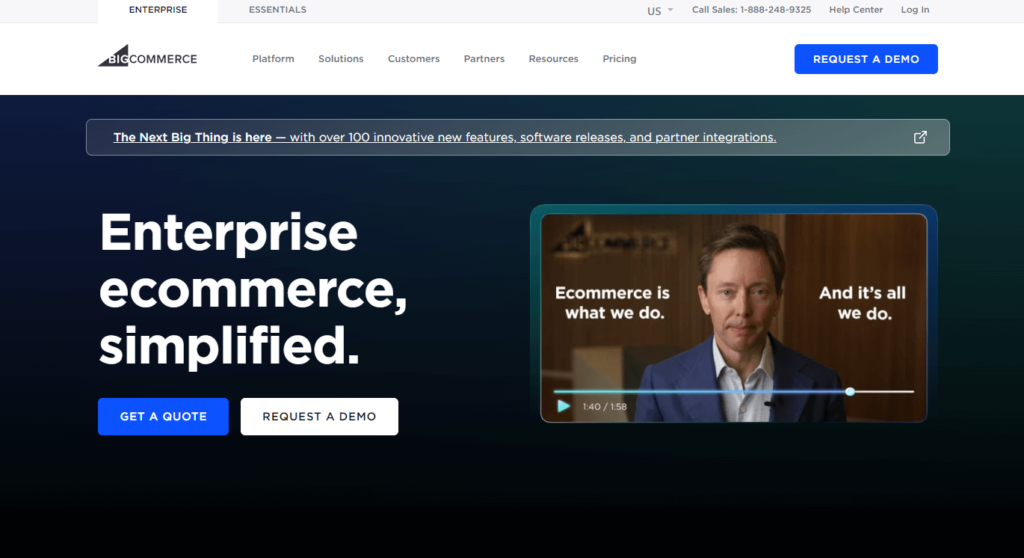
BigCommerce is one of the biggest WooCoomrece competitors when we talk about the best CMS for eCommerce websites. And the most trusted platform for launching your dream ecommerce business on their platform.
It is the 5th most popular and best CMS for eCommerce websites, with a market share of nearly 8%. This platform is trusted by many entrepreneurs, from small businesses to big corporations.
BigCommerce comes with all the features you need to create an online store website, such as customizable templates, marketing tools, payment gateways, shipping options, and more that you need to grow your online stores quickly.
Like other CMS builder, they also offer an easy-to-use drag-and-drop builder, which is helpful for those who are not familiar with coding. This comes with a visual editor, so you can see the changes you make in real-time.
Popular Users: Skullcandy, Burrow, Anchor and CREW, Molton Brown, Ben & Jerry’s, and more.
Pros and Cons
Pros
- User-friendly interface with drag-and-drop builder.
- Good customer support team.
- Wide variety of templates and customization options.
- Built-in marketing tools for promoting your online store.
Cons
- Limited free templates compared to other platforms.
- Higher pricing plans for advanced features.
Pricing
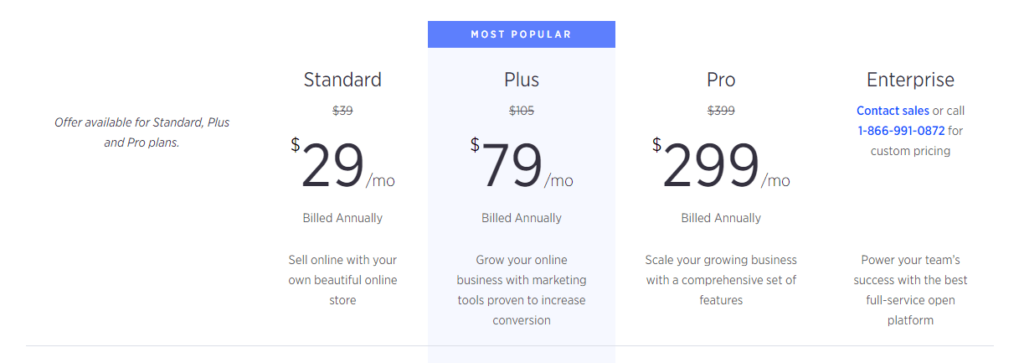
BigCommerce offers a 15-day free trial for those who want to test out their platform before committing. Their pricing plan comes with two different tiers, and you can go with the monthly or annual plan. If you go with their annual plan, then you can save up to 25% from any of their packages.
BigCommerce comes with 4 different pricing plans such as Standard, Plus, Pro, and Enterprise. Their most affordable Standard plan comes at $29/month, Plus plan comes at $79/month, Pro comes at $299/month, and you need to contact them for their Enterprise pricing plan.
6. Magento / Adobe Commerce

Magento is one of the most popular CMS by Adobe, which is the most widely used CMS builder in the world. It has been listed as one of the best and most popular eCommerce platforms with over 4% market share.
Magento is suitable for all kinds size eCommerce businesses from small businesses to big corporations. They offer limitless customization options, flexibility, and scalability like their parent company Adobe.
Popular Users: Coca-Cola, Land Rover, Ford, Asus, Nike and more.
Pros and Cons
Pros
- Open-source and customizable platform.
- Scalable for large stores and businesses.
- Wide range of features and integrations available.
Cons
- The pricing plan is very high
Pricing
Magento offers two different pricing plans for its customers, Commerce Pro and Magento Services. When we talk about features, all of these two pricing plans offer almost similar features to others.
However, the pricing plan is very high, as are the features. Their basic Commerce Pro pricing plan starts at $22,000/year, and this price can go up to $125,000/year for large businesses with a high volume of sales.
The pricing plan is not accurate, it can be bigger or less. Because Magento doesn’t reveal its pricing plan publicly. You need to contact them personally to get an accurate price for your eCommerce website.
7. Drupal
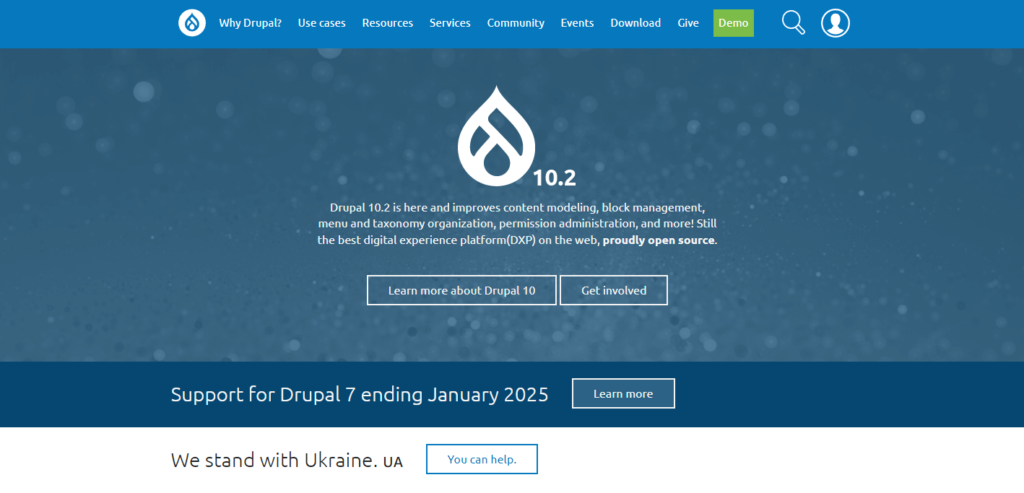
Drupal is another most popular open-source CMS platform in the world. This is a market share of nearly 2.5% and is considered one of the best CMS for creating eCommerce websites.
Drupal comes with thousands of free modules that offer various features to enhance your ecommerce website performance, security, and more. This platform is suitable for creating all types of websites, from small businesses to large corporations.
Popular Users: Tesla, Weather.com, Nokia, Oxford University, Wish, and more.
Pros and Cons
Pros
- Free and open sources
- Multilingual support.
- Highly customizable platform.
- Multilingual support.
- Great for SEO and performance optimization.
Cons
- Requires technical knowledge to use effectively.
- Limited options for beginners.
- Limited third-party app integration
Pricing
Drupal and Drupal Commerce are fully free open-source CMS, which means you can download and use them without any cost.
What is CMS?
CMS (Content Management System) is the most popular platform that helps you create and manage a website without any technical knowledge.
A website is made with many programming languages, such as HTML for content structure, CSS for styling, and JavaScript for making it interactive. However, a CMS platform allows you to manage all of these things without writing any code manually.
If you go with a CMS builder like WordPress, Shopify, Joomla, or another CMS, then you don’t need to write a single line of code to build your dream website. By using that most popular platform, you can create your website with a drag-and-drop builder.
Most CMS software comes with thousands of premade demos and templates, which is helpful for those who have no experience in website building.
Overall, a CMS platform is a great solution for those who don’t have enough money or time to create a custom code website.
Benefit of using a CMS for eCommerce
Using a CMS website builder has a lot of benefits, especially for creating an eCommerce website. Here are some of the main advantages:
1. Easy to Use
One of the biggest benefits of using a CMS for ecommerce is that it is very easy to use for a beginner. You’ll find all of your needs in one place, and most of the CMS comes with a user-friendly interface that allows you to manage your ecommerce website without knowing a single line of code.
2. No Coding Required
CMS platforms allow you to create your dream website by writing a single line of code. On the other hand, if you go with a coding website, then you need to learn all the coding language which takes more than a year, or you need to hire a professional web developer.
3. Ready-made templates and Themes
Most CMS software like WordPress, Joomla, and Shopify comes with thousands of premade demos and templates. Which is helpful if you don’t want to start your website from scratch.
With a few minutes, you can import a premium demo and then customize it to your needs and requirements.
This makes the website creation process faster and more efficient.
4. Cost-effective
CMS platforms are very cost-effective compared to other custom-made websites. With CMS builder you need to download WordPress which is completely free to use and need to pay for domain and hosting. And then you’re ready to go with your website.
On the other hand, if you want to build your custom code website, then you need to pay a minimum of $5K to $50k for a professional eCommerce website.
5. SEO-Friendly
Most of the CMS platforms are very SEO-friendly compared to other custom-made websites. By using a CMS builder you can easily optimize your website for all the search engines and get a better ranking.
But with a custom-made website, it’s a little bit difficult to do proper SEO for your website.
FAQ About Best CMS For eCommerce
Which CMS platform is best for e-commerce?
According to our research, WordPress is the most popular CMS builder all over the world. And if you’re talking about the best CMS for eCommerce, then another name came which is Shopify.
What's better than Shopify?
WordPress is better than Shopify because of its customization flexibility, and large community support.
Why Shopify is better than WooCommerce?
Shopify and WooCommece’s main focus is to make it easy for beginners. But Shopify is more beginner-friendly than WooCommerce as far as features, ease of use, and customer support.
Is CMS better than HTML?
Yeah obviously! Because of time-saving and no coding required, CMS is better than HTML. With a CMS builder, you can easily create your business website without having any knowledge of coding.
Is WordPress still the best CMS?
Yeah! With more than 42.7% of websites using WordPress, it is still considered the best CMS platform in the world.
Conclusion
Hope this guide will help you find the best CMS for eCommerce websites.
Currently, there are thousands of different CMS builders available on the internet. So, choosing the perfect one for you can be a little bit difficult. For this reason, we’ve created this article to help you find the best eCommerce CMS for you.
Today we have discussed the top 7 best CMS for eCommerce platforms used for creating eCommerce websites, including WordPress, Shopify, Wix, Squarespace, Magento, and Drupal. All of them have their pros and cons.
But if you’re choosing the right one, then we recommend you go with WordPress or Shopify. If you’re finding affordable, easy-to-use, and more SEO features, then you can go with WordPress. If you’re looking for everything in one place without looking at the pricing plan, then Shopify is the perfect one for you.


